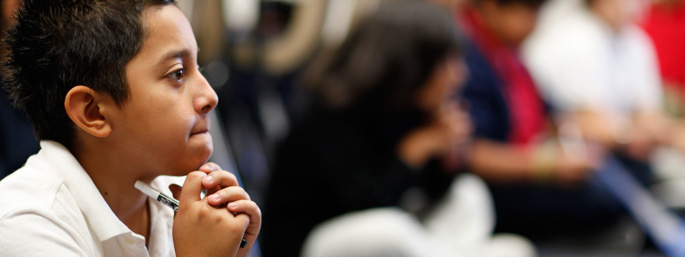The COVID-19 pandemic has forced schools across the country to confront unprecedented challenges. Teachers, principals, and school support staff are doing heroic work to offer stability for students and families during this crisis by providing meals, home learning resources, and at-home instruction.
But the longer schools remain closed—likely through the end of the academic year in most states—the higher the stakes become for next school year. A recent study predicted that students will experience a learning loss of 30 percent in reading and 50 percent in math as a result of the crisis. Left unchecked, it’s an academic setback that could derail the futures even of students who were previously on grade level—and would be disastrous for students who were already behind.
To tackle these challenges, school systems need to focus on strategies proven to accelerate student learning. We know that typical remediation—assigning work better suited for earlier grades—won’t come close to catching students up and will likely compound the problem. In The Opportunity Myth, we found that this approach of “meeting students where they are” practically guarantees they’ll lose more academic ground and get even less access to grade-level work in the future. The students stuck in this vicious cycle are disproportionately the most vulnerable: students of color, from low-income families, with special needs, or learning English.
In other words, doubling down on current strategies for catching students up will only widen opportunity and achievement gaps. Schools need to be ready on the first day back with a fundamentally different strategy for diagnosing lost learning and putting every student on a fast track back to grade level—a strategy designed to accelerate their exposure to grade-appropriate work, not delay it.
Today, we’re releasing a new resource, the Learning Acceleration Guide, to help school systems create and implement that strategy. It’s organized around a few key questions:
- How can schools create a plan to accelerate student learning?
- How can schools accelerate student learning in the next two years?
- What other challenges should schools anticipate as they plan to accelerate student learning?
We explain in detail how schools can help students catch up without delaying the introduction of grade-level material, by providing “just-in-time” interventions to fill in learning gaps from the previous school year. We recommend that schools:
- Prioritize the most critical prerequisite skills and knowledge for each subject area and grade level now.
- Plan an approach to diagnosing students’ unfinished learning in that prerequisite content knowledge and those prerequisite skills.
- Adapt scope and sequence/pacing guidance for each subject area and grade level to reflect where teachers might need to provide acceleration support.
- Train teachers and leaders to diagnose students’ unfinished learning and provide acceleration support.
- Monitor students’ progress on grade-appropriate assignments and adjust supports for teachers and leaders based on student results.
This approach to helping students catch up will feel new to most teachers and school leaders. Adopting it won’t be easy, especially given the many other challenges schools will face when they reopen. But the alternatives—going back to “business as usual” approaches to teaching and learning in the face of massive learning loss, or ramping up existing remediation strategies guaranteed to make things worse—are unthinkable.
To do right by our students in the aftermath of this crisis, we need a different approach. We hope our guide will help system leaders, school leaders, and teachers make the shift from remediation to acceleration in 2020-21 and beyond.





